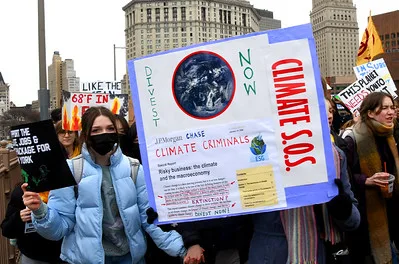In recent years, Gen Z has emerged as a powerful force in the global fight against climate change, and its impact is being felt worldwide. With their future at risk, they are using their anxiety as fuel for action. From social media campaigns to entrepreneurial ventures, this generation is transforming their concerns into tangible actions that help protect the planet. Here are five key ways Gen Z is leading the charge for climate action.
Harnessing Social Media for Climate Activism
Gen Z has a unique relationship with climate change, often using digital platforms to spread awareness and mobilize movements. In fact, according to a Pew Research Center report, climate change was identified as a “defining issue” for Gen Z. Over 50% of surveyed ranked it a top priority. (Tyson et al., 2021). This generation has harnessed social media platforms like TikTok and IG as powerful tools for climate activism.
One standout example is Mari Copeny. Also known as “Little Miss Flint,” she gained national attention at eight when she wrote a letter to President Obama about the water crisis in her hometown of Flint, Michigan. Since then, Mari has become a vocal advocate for clean water and environmental justice. Above all, she uses her platform to highlight the ongoing struggle for safe drinking water in marginalized communities. She also highlights ecological racism and how it intersects with the climate crisis.
Copeny’s activism has inspired others to take action. Her social media presence raises awareness about climate justice and reaches millions of people. She once said, “I want to make sure kids know they can make a difference, no matter how young they are.”


Leading Youth-Driven Climate Movements
Youth-led movements making a global impact are at the heart of Gen Z’s climate activism. For example, a young activist named Alexandria Villaseñor founded Earth Uprising International. Earth Uprising is a global movement that empowers young people to advocate for climate education, justice, and systemic change. The organization’s strikes, educational campaigns, and youth summits ensure that young voices are heard in the global fight against climate change.


Earth Uprising underscores the importance of intergenerational collaboration in the fight against climate change. While young people are taking the lead, the organization acknowledges that holding fossil fuel industries and policymakers accountable is crucial. It also emphasizes the need for older generations to work alongside them, as today’s policy decisions will shape the world that younger generations will inherit.
Earth Uprising has mobilized youth worldwide to take direct action, engage in political processes, and demand structural reforms. They continue to push for changes in education systems so that climate science and solutions are taught in schools. The additional education will undoubtedly ensure that future generations are equipped to tackle the climate crisis.
Pioneering Eco-Friendly Entrepreneurship
Rather than waiting for major corporations to adopt sustainable practices, Gen Z is actively creating its own solutions. From zero-waste startups to fashion lines using recycled materials, young entrepreneurs are redefining sustainability. Gen Z is pioneering eco-entrepreneurship by building businesses that focus on sustainability, reduce environmental impact, and offer consumers greener alternatives. Two standout examples of this movement are Pela and Zero Hour.
Pela: Leading with Biodegradable Products
Pela is a shining example of how eco-entrepreneurship changes industries from the inside out. They produce biodegradable phone cases, which help tackle the massive plastic waste problem in the tech accessories market. The company’s mission is to reduce the use of non-recyclable materials by offering consumers stylish, durable, and utterly compostable phone cases. Pela also goes beyond product innovation by advocating for zero-waste living. And they’ve committed to being climate-neutral by offsetting their carbon emissions. Their Pela 360 program encourages customers to return old phone cases for recycling. Thus, it promotes a circular economy where waste is minimized and materials are reused. This eco-conscious approach sets a new standard for consumer products, showing how entrepreneurship can be profitable and planet-friendly.
Zero Hour: Empowering Youth Entrepreneurs
Zero Hour is not just a climate movement; it’s also a platform that empowers young entrepreneurs to start businesses with sustainability at their core. Founded by Jamie Margolin, Zero Hour focuses on youth-led climate activism. They also help budding entrepreneurs navigate the complexities of building eco-friendly businesses. Zero Hour supports the next generation of business leaders through mentorship, workshops, and resources in developing products and services that prioritize environmental responsibility. They encourage innovation in renewable energy, sustainable fashion, and zero-waste products by promoting sustainability-focused startups. This organization helps young entrepreneurs create businesses that challenge conventional industries. They also offer scalable, sustainable solutions to some of the world’s most pressing environmental issues.
Both Pela and Zero Hour demonstrate how Gen Z is pushing the boundaries of eco-entrepreneurship. These companies are not just making profits. They’re setting the stage for a future where business success is directly tied to environmental impact, and young people lead the way in creating a more sustainable economy.
Using Art and Culture to Elevate the Climate Conversation
Art and culture have become powerful tools in Gen Z’s climate activism. They allow young people to communicate the urgency of the climate crisis in ways that resonate on an emotional and visual level. Here’s how these examples are leading the charge:
Global Youth Climate Art Competition
The Ocean Awareness Contest is a platform for young people to learn about environmental issues through art-making and creative communication, explore their relationship to a changing world, and become advocates for positive change. This competition, run by BowSeat, invites young artists worldwide to creatively express their concerns about environmental issues, from deforestation to rising sea levels. By offering a platform for youth to showcase their work, the competition turns abstract climate data into compelling visual stories that can evoke emotions and spark conversations. Art in this context doesn’t just inform. It engages the audience, making complex issues like climate change more accessible and relatable. Through painting, photography, sculpture, and more, these young artists communicate potent messages that words alone often cannot.


Billie Eilish’s Gen Z Climate Change Activism
On the music front, pop star Billie Eilish has become a vocal advocate for climate action. She seamlessly weaves environmental themes into her music. Eilish uses her massive platform to promote sustainability and incorporate climate awareness into her lyrics, music videos, and even concert tours. Her album “Happier Than Ever” features imagery that subtly references the human impact on nature. While her public stance on issues like climate anxiety resonates deeply with her primarily young fanbase.


These examples show how art can transcend traditional activism in its many forms, allowing Gen Z to engage audiences on a deeper, more emotional level. Ultimately, this helps elevate climate awareness beyond scientific reports and everyday life.
Demanding Policy Change and Accountability
Gen Z knows that actual change goes beyond personal lifestyle adjustments. They’re pushing for institutional accountability, demanding governments and corporations take responsibility for climate action. According to Novak (2023), zoomers are likelier to engage with political candidates who support aggressive climate policies. 45% of voting-eligible Gen Z actively researching candidates’ climate positions before voting.
In Aotearoa/New Zealand, youth activists have been vocal about their disillusionment with the current political leadership regarding climate change. They feel abandoned by those in power, believing meaningful action is consistently delayed or ignored. One young activist clearly articulated this frustration, saying, “No one is going to rescue us.“ This sentiment captures the growing sense of urgency and the belief that responsibility for fixing the climate crisis falls on their shoulders.
These activists understand that their generation will bear the brunt of the climate crisis. Leaders three times their age make decisions that will shape their future. Yet these leaders likely won’t live long enough to face the worst consequences. In this context, many rangatahi (youth) are stepping into leadership roles, engaging in protests, and even running for political office. They see structural reform as essential and focus on advocating for policies addressing climate change and social justice. This underscores the need for intergenerational cooperation and demands immediate and decisive action.
Conclusion: Turning Anxiety into Action
Gen Z is not succumbing to climate anxiety but rather turning it into impactful activism. They do so through digital platforms, innovative businesses, and direct political engagement. Zoomers’ determination is actively shaping a more sustainable future by harnessing social media, leading movements, fostering sustainable entrepreneurship, and demanding policy reform.
Who We Are:
Nature Vibes Media is a grassroots organization dedicated to sharing impactful environmental news and telling the stories of Gen Z climate activists. We aim to inspire action by highlighting young leaders’ incredible work to combat the climate crisis. In addition to reporting on the latest environmental activism, we offer practical, in-depth guides to help you incorporate sustainable practices into your everyday life. Looking to make a difference? Check out our latest post, “How To Find Sustainable Fashion Brands On A Budget.” If you’d like to contribute to our mission by sharing ideas or content, fill out the contact form on this page. We’d LOVE to hear from you! 🙂


Leave a Reply